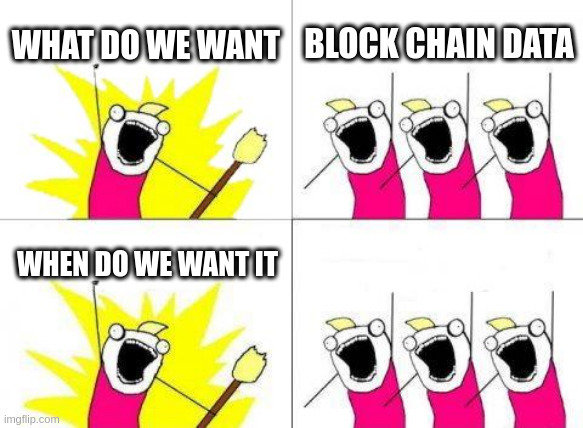Facilement récupérer les données des block chains en utilisant les messages P2P
Lola Rigaut-Luczak
- Ingénieure en informatique
- Intéressée par les crypto-monnaies depuis 2013

Les crypto-monnaies

P2P Network
Les noeuds communiquent entre elles en utilisant un réseau de communication dit pair à pair.
Les noeuds s'envoient des messages pour récupérer des blocks, des transactions, d'autres pairs...

It is not ... JSON RPC
Le serveur JSON RPC est utilisé lorsqu'un utilisateur souhaite parler à son noeud et uniquement son noeud.
{
"jsonrpc": "1.0",
"id": "curltest",
"method": "getblock",
"params": ["00000000c937983704a73af28acdec37b049d214adbda81d7e2a3dd146f6ed09"]
}Tous les messages/commandes P2P
- version
- verack
- addr
- inv
- getdata
- notfound
- getblocks
- getheaders
- tx
- block
- headers
- getaddr
- mempool
- ping
- pong
- reject
- filterload
- filteradd
- filterclear
- merkleblock
- sendheaders
- feefilters
- ...
Message structure
| Field size | Description | Data type |
|---|---|---|
| 4 | magic bytes | Unsigned Integer (32 bits) |
| 12 | command | String (12 char) |
| 4 | length | Unsigned Integer (32 bits) |
| 4 | checksum (double sha 256) | Unsigned Integer (32 bits) |
| ? | payload | Bytes |
Exemple
C0C0C0C076657261636B000000000000000000005DF6E0E2
^ "verack" message
C0C0C0C0 <-- Dogecoin mainnet magic bytes
76657261636B000000000000 <-- "verack" command
00000000 <-- payload length
5DF6E0E2 <-- checksum of payload
Ecrire notre noeud sur-mesure en python
Ce que notre noeud va faire :
- Se connecter à un autre noeud
- Faire une requête pour avoir les premiers blocks
- Deserialiser les blocks
Se connecter à un noeud

Se connecter à un noeud
import socket
import struct
import sys
import time
MSG_BLOCK_TYPE = 2
HOST = "51.158.74.86"
PORT = 18444
GENESIS_BLOCK_HASH = "3d2160a3b5dc4a9d62e7e66a295f70313ac808440ef7400d6c0772171ce973a5"
print("Attempt to connect to node")
s = socket.socket(socket.AF_INET, socket.SOCK_STREAM)
s.connect((HOST, PORT))
# Prepare Version Message
version_message = prepareVersionMessage(HOST, PORT)
payload = preparePayload(version_message, b'version')
# Send Version Message
s.send(payload)
# Received Version Message
wait_for(s, b'version')
payload = preparePayload(b'', b'verack')
s.send(payload)
wait_for(s, b'verack')
Version message
| Field size | Description | Data type |
|---|---|---|
| 4 | version | Integer (32 bits) |
| 8 | services | Unsigned Integer (64 bits) |
| 8 | timestamp | |
| 26 | remote node address | |
| 26 | local node address | |
| 8 | nonce | unsigned integer (64bits) |
| ? | user agent | String |
| 4 | start height | Integer (32 bits) |
| 1 | relay | bool |
Récupérer des blocks

message getblocks
| Field size | Description | Data type |
|---|---|---|
| 4 | version | Unsigned Integer (32 bits) |
| 1+ | hash count | Compact Size |
| 32+ | hashes | Char[32] |
| 32 | stop hash | Char[32] |
message inv/getdata
| Field size | Description | Data type |
|---|---|---|
| 1+ | count | Compact Size |
| 36 x ? | inventory (hash+type) |
message block
| Field Size | Description | Data type |
|---|---|---|
| 4 | version | Integer (32 bit) |
| 32 | previous block | Char[32] |
| 32 | merkle root | Char[32] |
| 4 | timestamp | Unsigned Integer (32 bits) |
| 4 | bits | Unsigned Integer (32 bits) |
| 4 | nonce | Unsigned Integer (32 bits) |
| 1+ | transaction count | Compact Size |
| ? | transactions | Transaction |
blocks_count = 0
next_hash = GENESIS_BLOCK_HASH
print("Asking for a new batch")
get_blocks_message = prepareGetBlockMessage(next_hash)
payload = preparePayload(get_blocks_message, b'getblocks')
s.send(payload)
l = 0
while l <= 1:
# if 1 count it means it just tell us about a new block
inv_message = wait_for(s, b'inv')[24:]
l, offset = getCompactSize(inv_message[0:9])
print("l value is {}".format(l))
if l == 501:
# There are giving us an extra block (probably the latest block discover)
l = 500
for i in range(l):
(type, hash) = struct.unpack('I32s', inv_message[offset+(36*i):offset+(36*(i+1))])
# do we really need that ?
assert(type == MSG_BLOCK_TYPE)
if i == l-1:
next_hash = hash[::-1].hex()
# We can send the message now
payload = preparePayload(inv_message, b'getdata')
s.send(payload)
count = llog = ''
# Wait for 500 responses !
while count > 0:
# Received Inv Message
data = wait_for(s, b'block')
if data == 0:
print("ERROR : missing block")
sys.exit()
# verify data
magic, command, m_length, chcksm = struct.unpack('4s12sI4s', data[0:24])
if b'block' not in command:
print("ERROR : wrong command")
sys.exit()
if len(data[24:]) != m_length:
print("ERROR : Wrong length")
sys.exit()
block_message = data[24:]
count -= 1
hash = checksum(block_message[0:80])[::-1].hex()
print("Count : {} - Block hash {}".format(blocks_count + 500 - count, hash))
log += "----- {} -----\n".format(hash)
Récupérer tous les blocks
Désérialiser les blocks
print("Count : {} - Block hash {}".format(blocks_count + 500 - count, hash))
log += "----- {} -----\n".format(hash)
txs = unpackBlock(block_message, False)
for tx in txs:
log += "{}\n".format(tx.hex())
print(log)Pour aller plus loin :
- Désérialiser les blocks AuxPoW (auxiliary proof of work)
- Collecter les données des noeuds (IPs, User Agent, localization, ...)
- Les transactions non confirmé
- Un système d'alerte

Conclusion
Venez me voir pour une démo
Facilement récupérer les données des block chains en utilisant les messages P2P
By Lola Rigaut-Luczak
Facilement récupérer les données des block chains en utilisant les messages P2P
- 182



